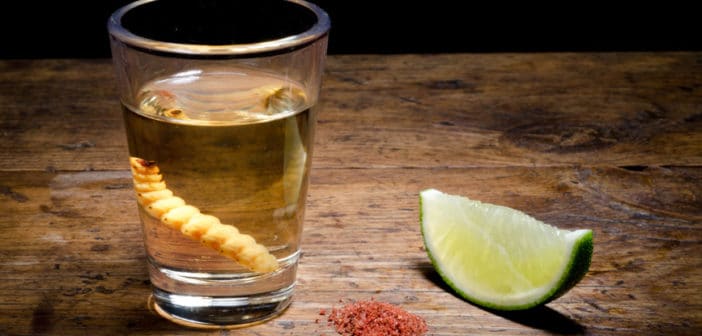This post was originally published on May 4, 2015.
While I was partying with some folks from Oaxaca about a decade ago, my friend Julio dared me to swallow the worm submerged at the bottom of a bottle of mezcal. Being amazingly drunk, I acquiesced enthusiastically, only vaguely curious as to why natives of that Mexican state liked to pair their liquor with worms. Later, I would discover the critter naturally ends up in vats of the agave distillate, and, given that Oaxacans don’t mind chowing down on fried crickets and other critters, they had no problem leaving the agave worms in the bottles. Plus, it’s a great marketing gimmick.
But Oaxacans are no longer the only ones pairing worms with alcohol. American scientists believe we can get clues to solving the genetic puzzle of alcoholism by inebriating worms.
Slithering While Intoxicated
Though scientists know genes play a role in alcoholism, they’ve yet to uncover a specific gene that makes some people more likely to abuse alcohol than others. On top of that, they suspect it isn’t necessarily one gene that’s implicated in alcoholism—most likely it’s the result of multiple genes or the interaction between genes.
A study recently published in Proceedings of the National Academy of Sciences describes how researchers from Virginia Commonwealth University examined the role of a protein complex called SWI/SNF in determining how roundworms react to alcohol. The scientists watched through microscopes as the worms’ ability to move deteriorated as they got drunk. The most wobbly worms stopped slithering altogether.
The nematodes’ initial sensitivity to the alcohol and tolerance varied based on which genes within the SWI/SNF complex were involved in the cellular response to alcohol. Since worms and humans, believe it or not, have a similar genetic makeup, the VCU researchers concluded that the SWI/SNF proteins may affect human alcohol tolerance the same way they affect tolerance in worms.
“The identification of genes that are critical in the development of tolerance in model systems such as worms will lead to future progress in understanding human dependence on alcohol,” says Brien Riley, a co-author of the study.
An Anti-Alcoholism Drug?
Tolerance is one thing that can lead to alcoholism in addition to craving and loss of control, according to the National Council on Alcoholism and Drug Dependence. “A low level of tolerance to alcohol has a protective element to it because you can’t drink so much,” Riley explains.
The scientists believe the study has significant practical implications, pointing the way to eventually identifying the genetic markers for alcoholism so we can be tested for it just as we can be genetically tested to see if we’re prone to getting cancer. It’s also possible that an anti-alcoholism drug could be developed after those genetic markers are identified.
“If we can better understand the molecular effects of alcohol, we can design more rational treatments and even warn people who are more susceptible to developing a dependence,” says Jill Bettinger, an associate professor of pharmacology and toxicology at VCU and senior author of the study.
The findings, though, have their critics.
“The key thing to understand with alcoholism is the relationship between genes and environmental factors,” says David Lewis, a professor of alcohol and addiction studies at Brown University. “And the environmental factors for a tiny worm and a human are poles apart.” He’s got a point—worms aren’t typically subject to abusive parents and humans don’t live in piles of topsoil.
Moreover, telling someone they’re at risk for alcoholism might not necessarily keep them off the sauce. With alcoholism running in most alcoholics’ families, many of them are warned early on to stay away from liquor. But does that stop them? Perhaps knowing you’ve got the predisposition would help a rational person keep the plug in the jug, but alcoholics keep drinking despite the warnings and consequences. No one could describe a true alcoholic as rational.
Now if only we could get those alcoholic worms into AA.
Sponsored DISCLAIMER: This is a paid advertisement for California Behavioral Health, LLC, a CA licensed substance abuse treatment provider and not a service provided by The Fix. Calls to this number are answered by CBH, free and without obligation to the consumer. No one who answers the call receives a fee based upon the consumer’s choice to enter treatment. For additional info on other treatment providers and options visit www.samhsa.gov.





